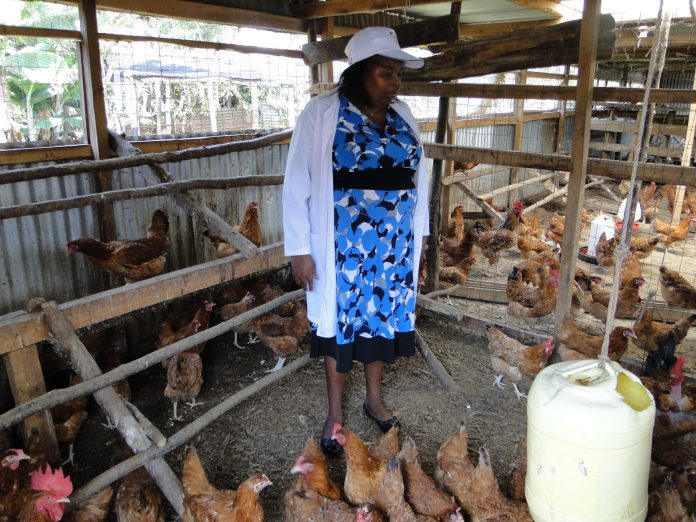Chicken farming can be lucrative if done correctly, and one farmer Winnie Cheruiyot from Tumbelion village in Kaplong, Bomet county, can attest to this.
Cheruiyot’s journey in chicken farming began in 2015 with 300 chicks from the Kenya Agricultural Livestock Research Organization (KALRO).
In 2021, she became a distributor of chickens developed by KALRO, following an extensive training on chicken production, including chicken handling practices, brooding, feeding, vaccination against common diseases, and record keeping.
“I was trained and thereafter started working with Kalro. I built the house. Upon inspection by Kalro, it met the recommended standard,” Cheruiyot says.
The farmer received the first batch of 500 KC1 one-day-old chicks from KALRO, of which 300 were hens. They began laying, and she sold the eggs to different farmers.
“I didn’t have a problem with the market. I got motivated because of the ready market. The demand was very high,” she says.
She noticed a high demand for the KC1 breed because of its colour. This improved indigenous breed also known as speckled or mottled is black and white spotted.
Kenyan farmer raking fortune from Okra value addition, exporting to South Sudan
Kalro livestock experts say the KC1, 2 and 3 chicken breeds have superior characteristics that make them suitable for subsistence and commercial farming.
The chicken has a rapid growth rate and starts laying eggs at just four-and-a-half months, unlike the pure indigenous kind that takes eight months. The males may attain a weight of 2kg within four months.
From the first project, Cheruiyot sold all the chicks earning Sh350,000.
“I earned Sh350,000. That was a lot. I had never handled such an amount without going for a loan.’’
The earnings motivated her. It dawned on her that poultry pays. Her market was in Bomet and Kericho counties.
“Poultry business is lucrative. If you invest in it and do it right, you’ll get some returns,” Cheruiyot says noting that it has enabled her purchase a car.
Cheruiyot’s revenue stream got a boost from selling one-month-old chicks. “At that time, they haven’t consumed much,” she says.
She also makes money from chicken meat and egg sales. The table egg can go for Sh15, whereas the fertilised one goes for Sh30.
“When I have extra cocks, I sell them and get some money,” Cheruiyot says. “I usually dispose of the layers for meat at 60 weeks.”









